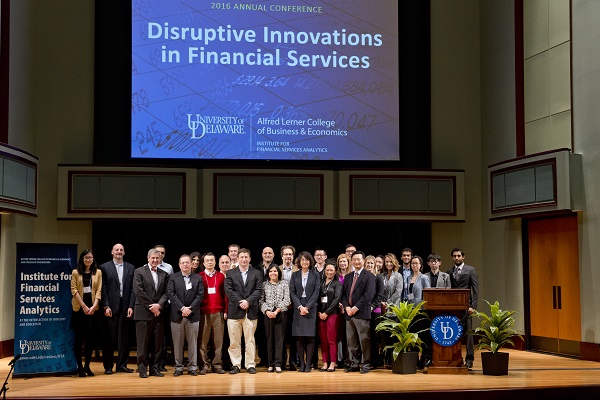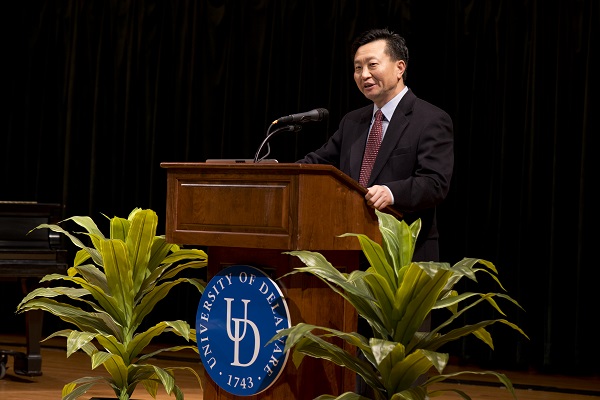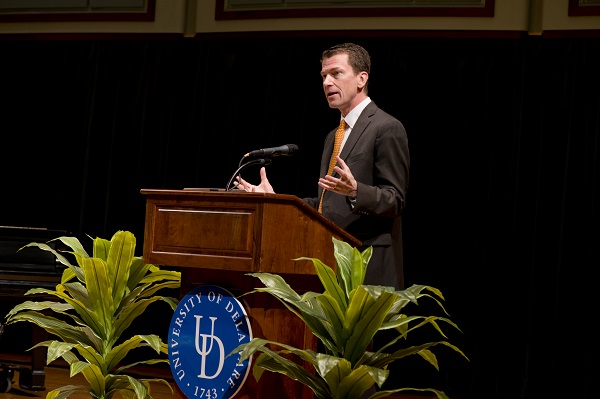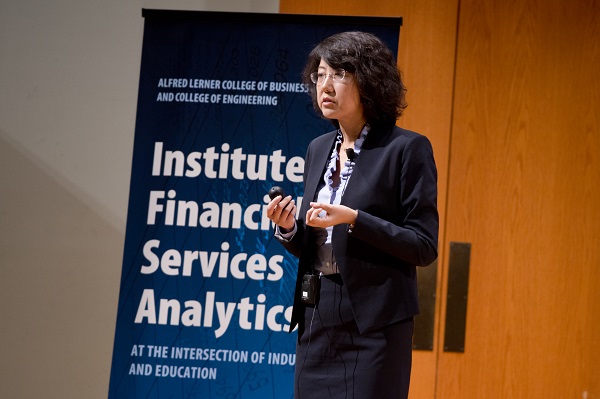

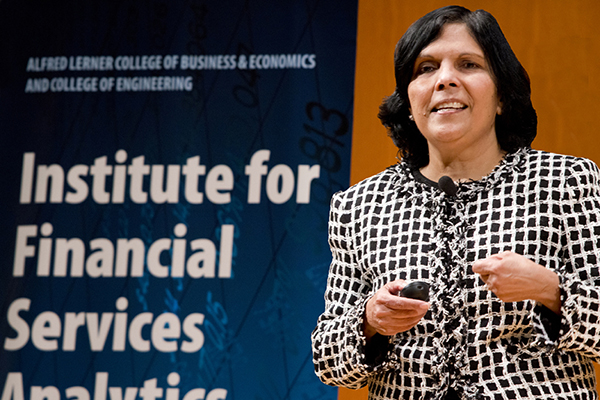
Innovating industry
IFSA explores financial innovations like peer-to-peer lending, crowdfunding, Bitcoin
11:24 a.m., March 25, 2016--To understand the real meaning of industry disruption, look no further than an old record collection.
“When the Walkman came out, the industry found this fantastic because we’d been buying vinyl records, and now we had to go buy all the records again on cassette. Because the Walkman was now a must-have technology to us, for the industry, this was a really good time.”
Campus Stories
From graduates, faculty
Doctoral hooding
So explained Bruce Weber, dean of the University of Delaware’s Alfred Lerner College of Business and Economics, at the 2016 annual conference of the college’s Institute for Financial Services Analytics (IFSA).
This year’s conference focused on disruptive innovations in the field of financial services analytics, and to set the stage Weber provided examples of the impact of innovations on other industries, like music and news.
Inventions like Napster, iTunes and free online news sites have continuously changed the way that consumers access and purchase these products, Weber said.
“The content producers, the generators of the information, now are in a battle to generate revenue from the value they create,” he continued. “The traditional channels struggle to figure out a way to get consumers to pay for their content.”
When considering industry disruptions like these, Weber explained, it’s important to consider the impacts of each innovation, both positive and otherwise.
“We’re all familiar with disruptive technologies that we use, like and benefit from as consumers,” he said. “We know that creates turmoil in certain industries, but we’ve seen over time as industry gets disrupted, in general the final outcome tends to be better economically for the consumer.”
“But there almost always will be these associated impacts,” Weber continued. “As academics, as researchers, as people in the industry, we want to keep our eyes open.”
FinTech helps make banking accessible for everyone
During the conference, several thought leaders in financial services explored recent innovations in the industry, from Bitcoin to peer-to-peer lending, and how they might impact the consumers of the future.
Reena Aggarwal, Robert E. McDonough Professor of Business Administration, professor of finance and director of the Center for Financial Markets and Policy at Georgetown University, gave a presentation on how innovations in financial technology (or FinTech) could help fill some of the banking industry’s most serious gaps.
“In the finance world, how can we address the complex problems that the global society is facing?” Aggarwal asked. “In my mind, one of the complex problems is the issue of equality and inequality. How do you provide access to capital? How do you make it easier for people access capital, whether as individuals or as small or medium sized enterprises (SMEs)?”
Aggarwal explained that SMEs are critical to the global economy in terms of job creation and economic growth, but that it’s difficult for SMEs and individuals to access capital without extremely high interest rates.
“We want financial inclusion,” she said. “We want to bring them into the banking sector.”
A number of innovations in FinTech, Aggarwal continued, are proving to be disruptive in ways that may solve these problems. These innovations include peer-to-peer lending and crowdfunding, which FinTech firms are investing in at increasing rates.
“Crowdfunding is very much a North American phenomenon, but it is becoming a European phenomenon,” she explained. “At some point, it’s going to hit emerging markets in bigger ways.”
“We will reach a tipping point where we will see some implications from all that is happening here,” she said. “I really hope that one of the disruptions will be serving the underserved markets that the formal financial sector is not capturing as yet.”
Aggarwal added that academic organizations like IFSA play an important role in understanding this continued industry growth and change.
“I’m a strong believer in what I call excellence in research to impact practice and policy,” she said. “It’s got to start with really good work coming out of higher education.”
Other speakers at the 2016 IFSA Annual Conference included Yihan Fang, CEO of Yirendai; George Samuel Samman, former CMO of Fuzo, committee chair of the Wall Street Blockchain Alliance (WSBA) and Brian Smyth, CTO, Emerging Payments, Chase Consumer Bank, JPMorgan Chase.
Article by Sunny Rosen
Photos by Lane McLaughlin




